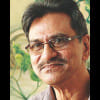
Kaiser Haq
Kaiser Haq is a Bangladeshi poet, translator, essayist, critic and academic.
Kaiser Haq is a Bangladeshi poet, translator, essayist, critic and academic.
Shahid Alam and I go back a long way, though we had both half-forgotten it until recently. He was two years senior to me at St. Gregory’s High School.
The book as a whole is a rigorously pursued exercise in the close reading of a fascinating and diverse array of modern texts that aren't quite in the category of the canonical mainstream.
Bangladeshi poetry has always been sensitive to socio-political issues and public themes. In discussing the poetic response to the Liberation War, therefore, it is useful to start with the broad historical background, move on to the literary tradition, and then consider the poetry itself.
The centenary of the Father of the Nation, and following on its heels the golden jubilee of the country’s independence, have precipitated a tireless round of celebratory events and an avalanche of varied publications.
For a couple of months after the 1970 elections everything seemed simple and straightforward.
I find two distinct types among denizens of the world of letters. There are writers single-mindedly focused on literary production in one genre or more, and others I would call, for want of a better term, literary personalities.
I had decided to write a brief review of Selima Chowdhury’s book when it was first published, but what with one thing or another making me put it off, a couple of years rolled by, and we found ourselves caught up in a pandemic with no end in sight.
Shahid Alam and I go back a long way, though we had both half-forgotten it until recently. He was two years senior to me at St. Gregory’s High School.
It is odd that nowadays One seldom hears the words
The book as a whole is a rigorously pursued exercise in the close reading of a fascinating and diverse array of modern texts that aren't quite in the category of the canonical mainstream.
Bangladeshi poetry has always been sensitive to socio-political issues and public themes. In discussing the poetic response to the Liberation War, therefore, it is useful to start with the broad historical background, move on to the literary tradition, and then consider the poetry itself.
For a couple of months after the 1970 elections everything seemed simple and straightforward.
The centenary of the Father of the Nation, and following on its heels the golden jubilee of the country’s independence, have precipitated a tireless round of celebratory events and an avalanche of varied publications.
I find two distinct types among denizens of the world of letters. There are writers single-mindedly focused on literary production in one genre or more, and others I would call, for want of a better term, literary personalities.
I had decided to write a brief review of Selima Chowdhury’s book when it was first published, but what with one thing or another making me put it off, a couple of years rolled by, and we found ourselves caught up in a pandemic with no end in sight.
At the Hay Dhaka Literary Festival of 2012 the celebrated Indian writer Vikram Seth, after reading some of his fine translations of Chinese poetry, remarked that he found it odd that his fellow South Asians were incurious about the great civilization north of the Himalayas.
A book may look like a house or a coffin But a maker of books cannot be contained between ordinary covers. Between the Muses’ minions, stodgy academics, Smarmy marketing men and discount-hungry retailers He waves a baton to conduct a chorus That threatens to collapse any moment into cacophony, Yet keeps the show going,